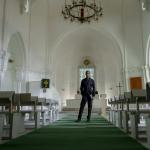Nothing worth doing is completed in our lifetime; therefore, we are saved by hope. Nothing true or beautiful or good makes complete sense in any immediate context of history;? therefore, we are saved by faith.? Nothing we do, however virtuous, can be accomplished alone; therefore, we are saved by love.
— Reinhold Niebuhr
This is my favorite day in Holy Week, this Saturday, this unrestful Sabbath, my favorite day in the whole of the liturgical calendar.
Well, actually, "favorite" is the wrong word. It's not that I like this day so much as that I understand it. It's recognizable, familiar, lived-in.
This day, the Saturday that can't know if there will ever be a Sunday, is the day we live in, you and I, today and every day for the whole of our lives. This is all we are given to know.
Easter Sunday? That's tomorrow, the day after today. We'll never get there in time. We can believe in Easter Sunday, but we can't be sure. We can't know for sure. We can't know until we're out of time.
Here, in time, there's just this day, this dreadful Saturday of not knowing.
There are some things we can know on this Saturday. Jesus is dead, to begin with, dead and buried. He said the world was upside-down and needed a revolution to turn it right-way-round and so he was executed for disturbing the peace. He came and said love was greater than power, and so power killed him.
And now it's Saturday and Jesus is dead and we're all going to die and everything I've told you about him turns out to be in vain and everything I've staked my life on turns out to be in vain. Our faith is futile and we're still hopeless in our sins. Jesus is dead and we are of all people most to be pitied.
That last paragraph is a paraphrase from St. Paul. What he actually says there, in his letter to the Christians in Corinth, is "if …" What he says, specifically, is:
If there is no resurrection of the dead, then Christ has not been raised; and if Christ has not been raised, then our proclamation has been in vain and your faith has been in vain. … If Christ has not been raised, your faith is futile and you are still in your sins. Then those also who have died in Christ have perished. If for this life only we have hoped in Christ, we are of all people most to be pitied.
But in fact Christ has been raised from the dead …
But that's Sunday language and Sunday certainty and it doesn't make much sense here on Saturday. Here on Saturday, we can hope it's true and we may even try to believe it's true, but we can't know "in fact" one way or another. Not now. Not on Saturday.
And to be honest, it doesn't seem terribly likely, because Saturday, this Saturday, is all we've ever known. Yesterday was this same Saturday, and so was the day before that, and the day before that, and the day before that.
Why should we expect that tomorrow will be any different?
Seriously, just look around. Does it look like the meek are inheriting the earth? Does it look like those who hunger and thirst for justice are being filled? Does it look like the merciful are being shown mercy?
Jesus was meek and merciful and hungry for justice and look where that got him. They killed him. We killed him. Power won.
That's what this everyday Saturday shows us — power always wins. "If you want a picture of the future," George Orwell wrote, "imagine a boot stomping on a human face — forever."
"But in fact," St. Paul says, the game changes on Sunday. Come Sunday power loses. Come Sunday, love wins, the meek shall inherit, the merciful will receive mercy and no one will ever go hungry for justice again. Come Sunday, everything changes.
If there ever is a Sunday.
And but so, this is why we hope for Sunday and why we live for the hope of Sunday. Even though we can't know for sure that Sunday will ever come and even if Saturday is all we ever get to see.















